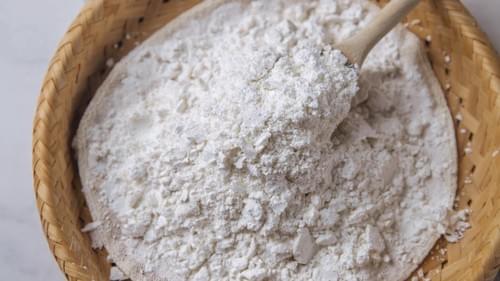
TEOCINTLE FLOUR NIXTAMALIZED 11 LBS CASE
Teocintle Nixtamalized Alkaline Corn Flour. (Zea mays parvaglumis or Mexicana). Teosinte is the flour the Mayans used. About 9,000 years ago, humans began to interact with wild teosinte in the Balsas River Valley of southern-central Mexico. Teocintle is considered the mother of corn and therefore holds a very important place in indigenous culture and beliefs. For many indigenous societies of the Americas, corn is considered the mother of all people and is the most important cultivated crop. The name teocintle is derived from the Nahuatl word teosinte which means sacred corn.
Ingredients: 100 % Teocintle Native Seeds Nixtamalized Flour
Packing: 2 lbs bag
Limited Production
Origin: Mexico.
Shipping costs may apply and an additional fee for the extra items.
Prices may vary without notice.
The site is Protected and secured also by FraudLabs Pro.
SKU: VFTEO11LBS
TEOCINTLE FLOUR NIXTAMALIZED
Teocintle Alkaline Corn Flour. (Zea mays parvaglumis or Mexicana). Teosinte is the flour the Mayans used. About 9,000 years ago, humans began to interact with wild teosinte in the Balsas River Valley of southern-central Mexico. Over several thousand years of seed stewardship, our ancient ancestors developed domesticated corn and the thousands of different varieties that exist today.
Teocintle is an extremely important crop, as it is believed that the subspecies parviglumis is the wild progenitor of corn. About 9,000 years ago, teosinte grew wild, as a grass-like plant, with grain in a tough shell that was dispersed only when ripe. Teosinte flour (Z. Mays).
This is to be considered a rare delicacy. The nutritional guide can seem constricted at times. Well, broaden your options with an old familiar in its original state, starch-free alkaline corn flour substitute! I know what you thinking- Corn is not on the list! Lol. Teocintle is the flour the Mayans used. There are many items that are not on the list because of accessibility. Well, in our continued commitment to offer authentic alkaline-approved items, we have now made Teocintle flour accessible. Go ahead and make Tamales, Tortillas, Gorditas and so much more! Get your Teocintle flour now! Available for a limited time only.

Teoscintle is considered the mother of corn and therefore holds a very important place in indigenous culture and beliefs. For many indigenous societies of the Americas, corn is considered the mother of all people and is the most important cultivated crop. The name teocIntel is derived from the Nahuatl word tosintli which means sacred corn.
Many indigenous peoples visiting the Native Seeds/SEARCH seed bank facility have honored the teocintle. One memorable moment came from Martina, a young Zapotec teacher from Oaxaca. She began to cry when holding the precious teosinte seeds. She spoke of how her family and culture have stories about sacred teocintle, but she had never been able to see it. To hold it was something very precious to her.


CULINARY USES:
Teocintle is not consumed widely. In Mexico, the stalk is chewed for its sweet juices, reminiscent of sugar. Archaeological evidence suggests the sweet juice from the stalks of teosinte was consumed prior to the discovery of the grain. The hard outer casing of the teocintle makes the dry grain inedible. It was a genetic mutation that caused this hard outer coating to disappear. Ancient plant breeders took advantage of this trait by saving and planting these kernels, essentially making corn what it is today.
Nixtamalization is a traditional process for preparing maize (corn) by soaking and cooking it in an alkaline solution, usually water with lime (calcium hydroxide). This process softens the kernels, removes the outer husk (pericarp), makes the corn more digestible, and increases its nutritional value by making niacin and amino acids more available to the body. The result, called nixtamal, can then be ground into a dough called masa for foods like tortillas and tamales.
How it works
- Alkaline solution: Dried corn kernels are boiled and then soaked in a solution of water and an alkali, traditionally wood ash or food-grade lime.
- Kernel softening: The high pH of the solution softens the corn kernels, making it easier to remove the hard outer shell (pericarp).
- Nutritional enhancement: The process makes nutrients like niacin more bioavailable and also increases calcium content.
- Dough creation: After soaking, the corn is washed to remove the pericarp and then ground into a pliable dough called masa.
Uses and products
- Masa: The nixtamalized dough is the base for many dishes.
- Tortillas: A staple of Mexican cuisine, made from nixtamalized corn dough.
- Tamales: Another popular dish made from masa, which is wrapped in a corn husk or banana leaf and steamed.
- Other foods: The process is also used to make other products like pozole, a traditional stew.





